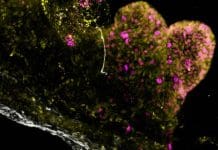University of Bristol researchers have discovered a VEGF-C gene therapy that protects the kidneys and may prevent serious complications in people with type 1 diabetes
Researchers at the University of Bristol have developed a pioneering gene therapy that could protect against kidney damage caused by type 1 diabetes — one of the disease’s most common and serious complications. By boosting a natural protein called VEGF-C, the therapy restored kidney function and cut damage by more than half in diabetic mice, offering new hope for treatments that target the cause of diabetic kidney disease, not just its symptoms.
The research is published in Molecular Therapy.
Gene therapy targets kidney damage at its root in type 1 diabetes
One in three people with type one diabetes will develop kidney damage during their lifetime, which can develop silently over many years, often going undetected until it becomes severe.
Current treatments can slow kidney damage, but none can tackle the root cause, a tiny filter called the glomerulus. The study found a 64% reduction in a damage indicator for kidney disease, paving the way for a potential new treatment.
The study, driven by first author Dr Aldara Martin Alonso and led by Dr Rebecca Foster, Associate Professor of Microvascular Medicine at Bristol Medical School: Translational Health Sciences, explored the potential of delivering a protein called VEGF-C directly into kidney cells.
VEGF-C gene therapy shows breakthrough results in preventing diabetic kidney disease
The team used a harmless virus to deliver VEGF-C directly into the kidney cells of diabetic mice to test if the new approach could be used to slow down kidney disease.
The researchers found that this approach not only improved kidney function but also protected a key part of the kidney filter that typically helps prevent damage. It led to a 64% reduction in albuminuria, the presence of a protein called albumin in the urine, which is a common sign of kidney disease.
Dr Foster, the study‘s senior author, explained: “Currently, there are no drugs specifically available to protect people with type 1 diabetes from kidney disease, despite their higher risk of developing kidney disease. This gap in treatment highlights the urgent need for new therapeutic approaches. Our goal was to investigate whether gene therapy could offer a viable solution by delivering VEGFC in a more targeted way.”
Dr Faye Riley, Research Communications Lead at Diabetes UK, which part-funded the study, said: “Kidney disease is a serious and life-altering complication of diabetes that can progress silently over many years. There is an urgent need for new treatments to prevent kidney damage in people with diabetes, and this novel approach tackles the root cause for the first time.
“While in the early stages, this promising research could lead to an entirely new way to protect the kidneys in people with diabetes and prevent devastating kidney failure.”
Dr Foster added, “This gene therapy approach has not been explored before in pre-clinical models and offers a long-term solution for these patients who are at risk of developing kidney disease.”








